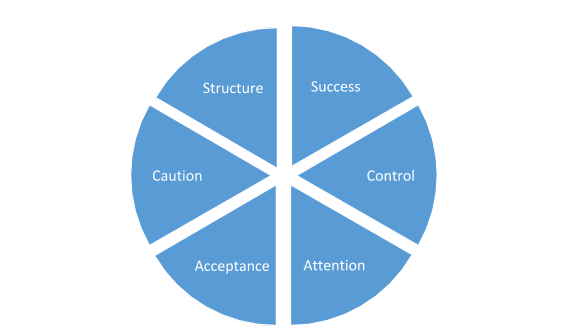I have frequently observed that when delegations of business executives meet their government equivalents there can be gaps in communication. This can be the result of different perspectives about the substantive issues. For example, businesspeople usually have very specific interests and the government officials have a sense of responsibility to a wider set of competing interests.
But there is often a more fundamental reason for the difficulties in communicating. Each side can use language in a manner that does not resonate with the other side. Let’s consider this issue.
The problem has to do with differing needs structures. When you think about why people take up certain occupations, it is reasonable to assume that different occupations, or different types of jobs will appeal to people of who have certain personal needs.
The model below presents six types of personal needs. We all have some mixture of these needs. None of them are better or worse than the others. But usually, some of these needs are more significant to our make up than others.
Six Personal Needs

Personal Needs of Business Executives
When I think about Business Executives, I can identify three needs that often rise to the top:
- Success – They like to win. They derive satisfaction through the achievement of results. They tend to pay attention to the metrics that define winning; whether its sales, market share, brand image, profits etc.
- Control – They want and/or are comfortable making decisions about factors within their environment – They know that decisions lead to action.
- Attention – They are comfortable getting credit for the success of their organization. Some business executives seek the attention.
Individual business executives may have slightly different profiles. Earlier in their career they may have been scientists or accountants, which tends to attract people with a higher need for Caution, but it stands to reason that if business executives don’t have Success, Control and Attention as dominant personal needs, it would likely lead to a significant amount of cognitive dissonance in their professional lives.
Personal Needs of Government Executives
When I think about Government Executives, which work in an environment where professional collegiality and a focus on complex policy formulation is rewarded, I think of three needs that often rise to the top:
- Structure – They must understand the big picture. They need to grasp the conceptual framework, or the process leading to a conclusion.
- Caution – They know the importance of and are comfortable requiring the information to assess the implications of potential decisions. They need to understand the underlying fact base and the credentials of any proponents. They are apprehensive about the impact of bad decisions.
- Acceptance – They are comfortable working within a collegial environment. Conflict is not cool.
Individual government executives may not fit this pattern exactly. There are high achieving bureaucrats that are seeking success, control and attention. But it stands to reason that if government executives don’t have Structure, Caution and Acceptance as dominant personal needs, it would likely lead to a significant amount of cognitive dissonance in their professional lives.
This article opened with the observation that meetings between business and government executives often lead to gaps in communication. As a communications strategy its important to use language and examples that will resonate with your audience. Therefore, businesspeople need to be more mindful of communicating in manner that responds to Structure, Caution and Acceptance. Government executives would be well served to use communication that is relevant to those with the needs of Success, Control and Attention.

